- cross-posted to:
- linguistics@mander.xyz
- humanities@beehaw.org
- cross-posted to:
- linguistics@mander.xyz
- humanities@beehaw.org
cross-posted from: https://beehaw.org/post/10656140
Extrait
What’s the difference between haha and jaja? What about kkkk or hhhh?
It’s a trick question: They mean the same thing. They’re all ways to express laughter, as interpreted by different cultures in different languages.
In person, laughter is universal. No matter what language you speak, almost anyone can understand the meaning of a mischievous giggle, sarcastic snort, or an infectious belly laugh. But it isn’t quite as simple when it comes to writing it down, especially in the era of social media and messaging apps.
Most English speakers are familiar with the nuances of when to say haha, lol, or lmao — each conveying a different weight to laughter. Other languages have their own specific terminology, some of which may not be immediately obvious even when translated.
Take Japanese, for instance. “Warau” is one way to express laughter. Some shortened that to just the first sound of the word, “w.” Others then noticed that “www” looked like blades of grass, leading people to start using the Japanese word for grass (草) to represent laughter. That continual evolution is why, if you want to write about laughing hard in Japanese, you could type 大草原: “giant grass field.”
Or there’s “askfhsjkd,” used in Turkish. No acronyms or wordplay here — keyboard spam is actually a popular way to indicate amusement among young Turkish speakers, as if they’ve been overcome by laughter and are unable to type complete words


